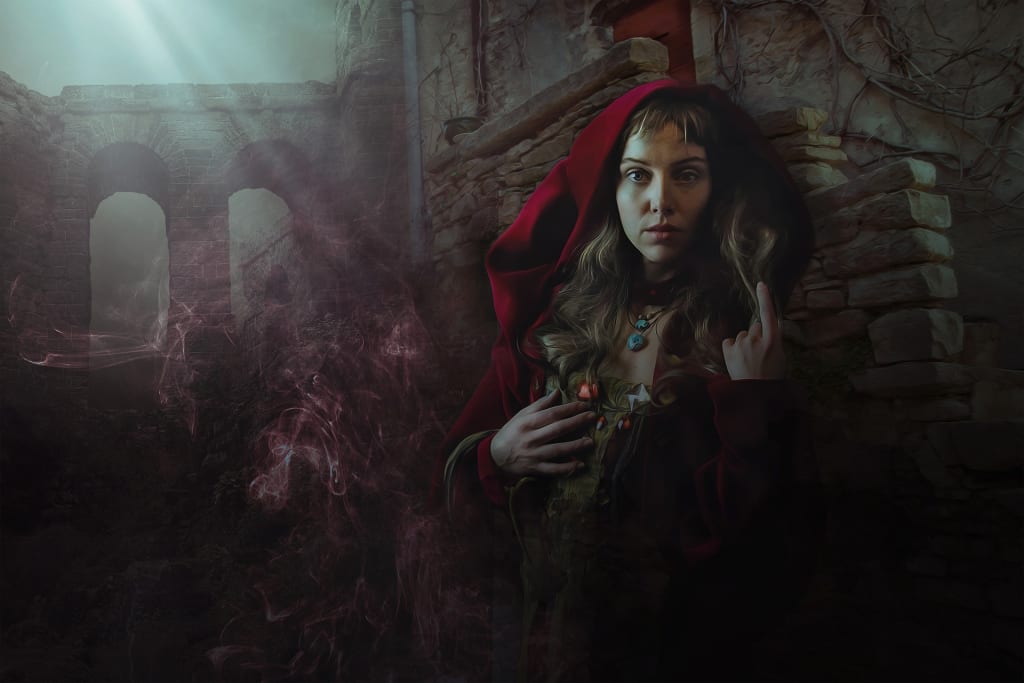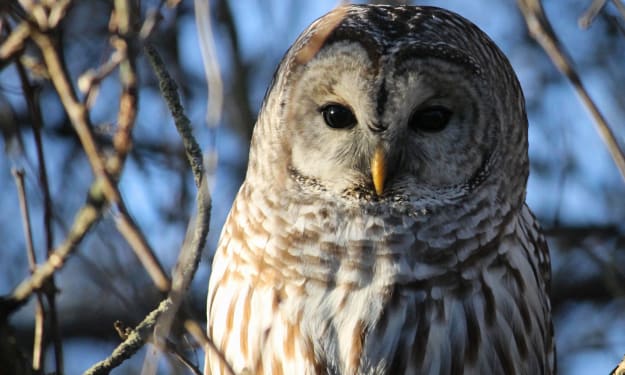The Book of Denya Léna
With the spilling of her blood, the young witch's prophecies began to come true.

There weren't always dragons in the Valley. Their rising came with the reading of the fourth chapter of the Book of Denya Léna, and by that time the people expected them. They had come to accept that all of the young witch's predictions came to pass soon after the words upon the page were consumed by human eyes, and they spent the few days leading up to the arrival of the dragons going about their business with hands cupped against brows, shading their eyes as they looked to the sky.
It was a time of anticipation; whether to feel dread, curiosity, or hope, nobody was certain.
Prior to this time of waiting, the reading of the third chapter had brought the earthquake that shook the Kingdom of Roàn with such a force as even the old people could not remember its equal, and which resulted in the forming of the Black Chasm that violently split the Valley in half like a jagged wound. The dragons eventually rose from the impossible depths of this rocky opening, against the expectations of those people looking skyward.
The natural divide later became a territory border, when the people themselves became divided into two camps: those who considered the Book of Denya Léna to be cursed with black magic, the forecasts of which could only be stopped if the book were destroyed, and those who revered it as a sacred collection of prophecies that only told of what was already destined to occur, and offered the only path of salvation.
Before the earthquake, the second chapter revealed the coming of the Great Parch, the season when there had been no rain and the crops and livestock had withered and died along with nearly half of the people of Roàn.
The first chapter, of course, told of the killing of Denya Léna herself.
The young witch had forescribed her own doom, her execution by beheading on the order of the ruthless King Merc who feared Magic above all else and hated any Beauty that did not belong to him (and Denya Léna was quite beautiful, as the old stories tell).
Denya Léna also warned of the consequences that would follow her death, that her blood seeping into the dry ground would arouse the dormant seeds of the peoples' destiny and set certain events into unstoppable motion, just as water poured upon a thirsty garden will allow it to flourish and grow.
I often wonder how she must have felt as she wrote the words that described her own death, as that very death drew nearer and nearer. Or perhaps she had been entranced, with no conscious thought at all, her writing hand serving as a mere conduit through which a more powerful energy flowed. Magic, or Spirit, or something else entirely.
But Alas, I am recounting the story backward. And there is much more to tell.
On the days leading up to her execution, it is said that Denya Léna sat on her hard dungeon billet scribbling page after page by candlelight, not sleeping a wink day or night, and ignoring the food and water—and certainly the priest— that the Queen sent to comfort and sustain her in the final hours.
Where the condemned woman got the parchment and quill nobody knows for certain. Some say she conjured it out of thin air, others that she seduced a guard with her hypnotic and sinfully feminine wiles. Or perhaps Queen Rayda took pity on her—the two were sisters after all— and granted her this seemingly harmless request. It was hardly something to deny her; weren't all prisoners granted one piece of parchment and a quill to write a final note of farewell to their loved ones? And why not spare the young woman a few extra sheets if that was all she desired?
If anyone had known of the turmoil that would come from those pages of scrawl, those hasty markings of ink scratched out by a doomed witch, the King would surely have had Denya Léna's hands preemptively lopped off and her tongue cut out of her throat for fear that she might dictate her visions aloud, breathe spoken life into them.
I ask you, how was anyone to know?
As she was led from her dungeon to the executioner's block, Denya Léna beseeched the Queen, who took from her sister's shackled hands the volume of pages that were bound together at the spine with a thin braid of Denya Léna's own hair. When it was over, when the executioner's axe had swung down in a final arc of flashing silver that spilled Denya Léna's blood onto the dirt, it is said that the moon eclipsed the sun and the Kingdom of Roàn was cast into shadow for four days and four nights.
On the last night of the darkness, Queen Rayda read the first chapter of her dead sister's book by candlelight.
The last verse read:
The roots of the nearest plant being shall nourish upon the witch's spilled blood, and this bush shall thrive henceforth without need of water nor nutrient, and shall glisten as butchered flesh in the welcome light.
The sun finally rose on the fifth morning, and the people rejoiced. But the Queen rushed out to the courtyard where her sister had been executed, and she saw that the foliage of the nearest mulberry bush was indeed growing a deep shining red rather than green, and with sharp thorns spiking up from amidst its horrible leaves. It was as the book had described, and Queen Rayda paled in fear, for in her heart she felt the foreboding terror and deep knowing that there would be much ill to come.
The Queen informed her husband the King at once, who dismissed her concerns about dark prophecies. He declared that Denya Léna had cast a final spell upon the bush before she died as an act of vengeance so that she might continue to terrify the Kingdom even from the grave.
He ordered his most trusted advisor, a man called Teirn, to lock the book away until the sin of it could be purged properly in a ceremonial fire. Teirn did so, but he had taken to heart Queen Rayda's warning and privately agreed with her that the book should not be dismissed so lightly, although he held his tongue in front of the King.
That night the rain poured down fiercely, and the mysterious book beckoned Teirn, who went to it in secret and read its second chapter, also by candlelight. As he finished the last page, the rain stopped and the sky cleared into a brilliance of stars. Even in its beauty and peaceful stillness, the sight of the suddenly cloudless night sky disquieted Teirn, and he returned to his bed-chamber with the last words of the chapter still echoing in his mind:
Not a drop of quenching water shall nourish the ground, yet those who eat of the blood tree shall not fear hunger, and the Kingdom shall be strengthened with the weeding out of the weak; the old and young and sick shall starve and those who remain will live to see a great changing of the times.
The day that followed was unseasonably warm, and at first, the people delighted in the welcome heat. But after a fortnight the world was already desperately thirsty, and the long torturous drought had only just begun.
The hot sun burned without mercy for many months and the vast fields of wheat and potatoes upon which the Kingdom depended shriveled to dust. Not a vegetable garden survived, for the water that was poured upon the plants sizzled and boiled, scalding the herbs before it had the chance to penetrate the soil. With no grass to eat, the goats and sheep and pigs grew thin, their skeletons poking through dull hides.
It was as Denya Léna had written, and many people died.
Now Teirn had eaten a leaf of the cursed mulberry bush and found he felt no hunger. He picked more of them and fed them to his family and loved ones, and gave them out to all who would take heed of his whispered assurances that they would not perish by the famine should they consume one of the blood-red leaves.
At twilight one evening Queen Rayda came upon him harvesting from the ever-leafing bush that did indeed thrive without water. Tiern confessed that he had read the second chapter of the Book of Denya Léna and explained to her the gift of the blood bush. He expected that she would have him seized by her guards for desecrating royal property, but instead the Queen plucked a jagged leaf from the bush and placed it into her own mouth, solidifying an unspoken alliance between them.
Rumours that both the Great Parch and the protective properties of the blood bush were prophecies of Denya Léna's book eventually reached the King. In a fit of anger, he had the mulberry bush cut down and burned rather than accept the possibility of its magic and the book's dark power.
Both Queen Rayda and Teirn appealed to the King, begging him to consider that along with the prophecies the book may also hold the key to their redemption. But King Merc refused to hear; instead, he pronounced that the book would be burned in a purgative ceremony the following sunrise.
Convinced that the Book of Denya Léna offered their only salvation, Queen Rayda and Teirn left the castle under the cover of night, never to return. They took the ominous book with them, saving it from the flames for better or worse. (It was a betrayal the King never forgave; spurred by his fury he spent the rest of his days striving to capture them and bring them to justice for their treason— but that story is for another time.)
That was the night Queen Rayda and Tiern read the third chapter of the Book of Denya Léna, as if under a spell. When they reached the end, they looked at each other in horror. Teirn closed the book forcefully and wrapped it in a shawl, as if shutting the words away could prevent the disaster that he and the Queen had discovered was to come.
At that very moment, the much-needed rain came at last, and the Queen realized that unlocking the secrets of each subsequent chapter would end the curse of the previous. This truth was confirmed in her heart when in the morning there was already fruit weighing down the branches of every tree, the fields were suddenly and miraculously lush and green, and the remaining livestock was fat again. The people knew the taste of food and the feeling of it upon their tongues once more.
Their celebrations were short-lived, for soon the rumbling of the earth began and there was no time for feasting. The ground was ripped open, creating the Black Chasm, and into its depths fell any being unfortunate enough to be standing on its destined path. With barely a warning the split tore through the Valley quick as a bolt of lightning, and the terrified screams of the falling souls went unheard beneath the sound of the breaking, tumbling rock that was as deafening as thunder.
When at last the heaving of the earth ceased, and the aftershocks ran their course, the people of Roàn got to their feet and embraced their loved ones. They cried and laughed with deliriousness and grief, and then they wiped off the dust and began to gather up their fallen and scattered belongings, restoring what they could of the wreckage and burning what was beyond repair.
As they worked, the carriage of Queen Rayda came into view and they waited in silence at her approach.
The Queen stood up, grim-faced before her people to deliver her famous speech, the one that would inspire both courage and fear, and would unwittingly sew the seeds of their future division—as a truth revealed so often does— turning brother against brother, husband against wife, neighbour against neighbour:
"Citizens of Roàn. I know you have suffered, first with the Great Parch and now this Black Chasm which has ravaged your homes and taken your loved ones. I feel for your pain and suffering. I too have suffered and lost. And I ask you now to call upon your courage, to lower your basket ever deeper into the wells of your endurance and to draw up your strength, even as you'd rather fall down on your knees and weep. For there is more to come, dear people."
She then held high the Book of Denya Léna for all to see. Every pair of eyes was fixed on it as they anxiously awaited her next words.
"Upon these pages are the prophecies of the Witch of Roàn, written in the days before her death. The blood bush, the drought, the earthquake— these were all foretold. And next, there will be Dragons."
Murmurs rippled through the crowd, and a remnant roll of thunder echoed in the distance.
"How many chapters are there in that cursed book?" someone called out.
The Queen, lifting her chin, replied, "Seventeen."
Silence thickened the air for a heartbeat before the gathered people broke into an agitated cacophony of discussion and debate.
"Burn the book!"
"No! It's better to know what is to come."
"Yes, why wait? Read it all now!"
"Heaven forbid! And bring all seventeen curses upon our heads at once?"
"If we never read them, they won't happen at all!"
The wailing plea of an old woman was heard over the noise of the crowd:
"Gods save us, what will become of us through it all?"
The people grew quiet and looked to their Queen. She could give them no answer.
And you, dear reader, must read on to find out.
About the Creator
Kate Sutherland
Kate is a Song-writer, an Artist, and a Kung Fu Teacher. She loves exploring a multitude of creative paths, and finds joy in inspiring others to do the same.






Comments
There are no comments for this story
Be the first to respond and start the conversation.